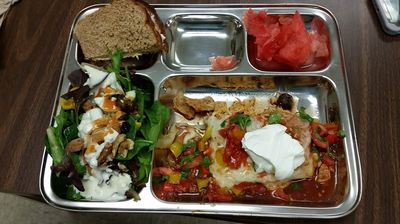Free and Reduced Lunch Application
Please download, fill out and return to Office@EagleSchoolRC.org or drop off in the office.
Eagle School’s Clean-Eating Commitment
What does it mean to “eat clean”?
Eating clean is a term that refers to eating whole, natural foods that have been minimally processed and are as close to their natural state as possible. Organic foods (foods that have been grown or raised without the use of pesticides, herbicides, growth hormones, or unnecessary antibiotics) are a perfect example of clean-eating. Eating clean also includes reducing or eliminating the use of foods that have artificial ingredients, dyes, preservatives, and chemicals.
Why eat clean?
There is a wealth of research available that has begun to reveal strong links between the chemicals and artificial substances in our food to a wide array of health concerns from cognitive-behavioral issues, such as ADHD, to life-threatening conditions, such as cancer. At Eagle School we believe that our bodies are a resource that God has given to us to use for good throughout the course of our lives. We believe that we have a responsibility to take care of this resource and make wise choices in regard to the health of our bodies, and an even bigger responsibility to teach the next generation the importance of this practice.
National School Lunch Program
Eagle School participates in the National School Lunch Program, which means that any students that would qualify for free or reduced breakfast and lunch prices at a public school also qualify for those same benefits at Eagle School.
Eagle School is committed to offering our students the highest quality of food available in taste, freshness, and most importantly, health. We believe that good fuel promotes brain and body health, and that our students deserve the best that we can give them.
How has Eagle School implemented clean-eating practices?
1. Eagle School has completely eliminated the use of artificial chemicals, dyes, preservatives, and other synthetic ingredients from the foods that are served to our students for our breakfast and lunch foodservice meals.
2. The kitchen staff at Eagle School makes the majority of school meals for our breakfast and lunch programs from scratch (base ingredients), dramatically reducing the use of highly-processed, pre-packaged foods.
3. The remaining food needs for the Eagle School breakfast and lunch programs are organic and locally-produced whenever possible.

“This institution is an equal opportunity provider.” In accordance with Federal civil rights law and U.S. Department of Agriculture (USDA) civil rights regulations and policies, the USDA, its Agencies, offices, and employees, and institutions participating in or administering USDA programs are prohibited from discriminating based on race, color, national origin, sex, disability, age, or reprisal or retaliation for prior civil rights activity in any program or activity conducted or funded by USDA.
